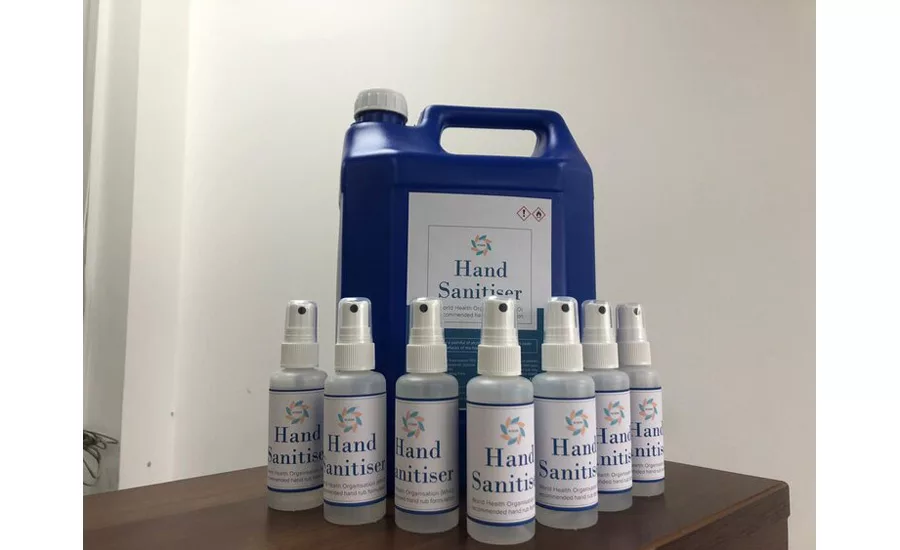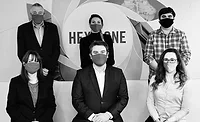Start-Up Works to Support UK Front-Line Workers

Hexigone Inhibitors, which usually manufactures chromate-free corrosion inhibitors, is manufacturing hand sanitizer to help protect staff on the front line. The sanitizer, which meets the standard set by the World Health Organization, is already in use in local organizations.
Britain has a rich history of manufacturing and many businesses have adapted to support the UK’s response to the pandemic. Hexigone Inhibitors is putting its skills into producing hospital-grade hand sanitizer. The start-ups’ large mixing vessels, which normally produce a highly effective corrosion inhibitor, are now working vigorously to meet demand from nationwide councils and care homes.
The COVID-19 crisis has put huge pressure on the PPE supply chain – leaving NHS staff and other key workers at risk of contracting the deadly virus. The main ingredient for hand sanitizer, isopropanol, is currently in huge demand worldwide. Nevertheless, the UK Government’s innovation agency, Innovate UK, linked-up Hexigone with pharmaceutical giant, Glaxosmithkline, which subsequently donated 8,000 liters of isopropanol to ramp-up production.
Ruth Bowley, Manufacturing Manager at Hexigone, commented, “We’re immensely happy that we are able to support the UK’s Covid-19 response. Key workers are vital to public health and safety during the coronavirus lockdown, and this is a gesture of thanks from our team to everyone on the front line.
“As a chemical manufacturer, adapting our skills and resources to produce hand sanitizer was an obvious fit, and we’re grateful to Innovate UK and Glaxosmithkline for supporting our efforts.
“We’re also very aware of the impact that the crisis has had on mental health, so we’ll be donating our profits to Mind – a UK-based mental health charity – to support vulnerable individuals through this time.”
The project started via the South Wales Additive and Rapid Manufacturing (SWARM) Consortia as a joint venture with Swansea University. And after some joint-learning when setting up the manufacturing process, the teams divided their efforts to increase output to the front line. The University is now able to maintain its own production in addition to Hexigone’s output.
For the sanitizer to be effective, it must contain at least 60% alcohol. The batches made by Hexigone are 75% - precisely made to the WHO recommended formulation - ensuring that the coronavirus and other microbial pathogens are killed. Other ingredients include water to dilute, glycerol to moisturize, hydrogen peroxide to kill any fungal spores, and finally, lemongrass essential oil to scent the sanitizer.
As a SME, the efforts need to be financially sustainable, so Hexigone is charging cost price for production. The price equates to less than half the usual amount being charged by some companies, so councils agreed to voluntarily donate 25% of production. As a result, out of every 1,000 liters made, 250 liters are given free to support key workers.
The team has also been instrumental in sourcing additional PPE for hospitals and care homes. They have coordinated local businesses to donate excess face masks to the cause – as well as all of their PPE stock – totaling over 1,600 FFP3 masks for the NHS.
Tom Bowtell, CEO of the British Coatings Federation added, “We applaud Hexigone’s efforts and quick thinking during this global pandemic. As our #EssentialCoatings campaign shows, BCF members are contributing in so many different ways, helping to meet increased demand for goods and products critical to the coronavirus response. This example of smart adaptation from ‘business as usual’ makes our members’ response to Covid-19 even stronger.”
Hexigone, which is currently going through its second round of investment, usually manufactures corrosion inhibitors that are a safe and highly effective alternative to the industry-standard, hexavalent chromate. The technology has won numerous awards, and the team is currently working with over 40 industry partners worldwide within the coating industry covering marine, oil and gas, and architectural industries.
Looking for a reprint of this article?
From high-res PDFs to custom plaques, order your copy today!




